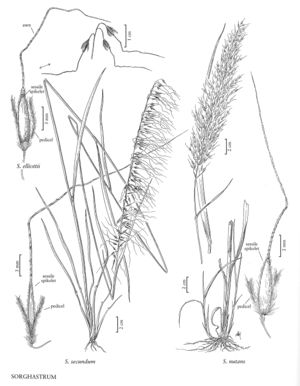Sorghastrum elliottii
Plants not rhizomatous. Culms 70-190 cm tall, 1.2-2.4 mm thick; internodes glabrous. Sheaths mostly glabrous, throats pubescent; ligules 2-5 mm, decurrent, ciliate; blades 20-55 cm long, 2.5-5.5(8) mm wide, mostly glabrous. Panicles 10-35 cm, open, arching, dark purple; rachises 0.3-0.8 mm thick 1-2 mm above the lowest node; branches capillary, flexible, longest branches 19.5-34.5 cm. Spikelets 6-7.5 mm long, 1.1-1.4 mm wide, dark chestnut brown at maturity. Calluses 1-1.3 mm, blunt; lower glumes 5.5-7.3 mm, glabrous, 5-veined; upper glumes 6.2-7.5 mm; awns 25-40 mm, 5 times longer than the spikelets, twice-geniculate; anthers 2-3 mm. Caryopses 2-2.5 mm. Pedicels 3-6.5 mm, flexuous. 2n = 20.
Distribution
Md., Okla., Miss., Tex., La., Ala., Tenn., N.C., S.C., Va., Ark., Ga., Ind., Fla.
Discussion
Sorghastrum elliottii usually grows in dry, open woods on sandy terraces of the lowlands in the southeastern United States, often over a clay subsoil. Plants with straight panicles and sessile spikelets that are 1.3-1.8 mm wide are sometimes called S. apalachicolense D.W. Hall, but the variation appears to be continuous and such plants are included here as S. elliottii.
Selected References
None.
